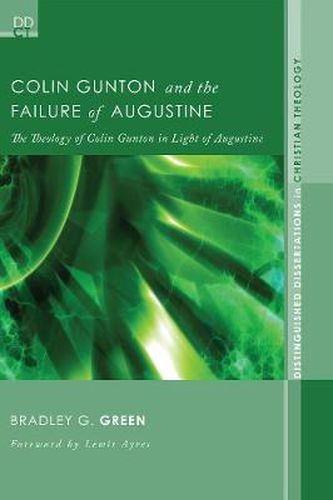Readings Newsletter
Become a Readings Member to make your shopping experience even easier.
Sign in or sign up for free!
You’re not far away from qualifying for FREE standard shipping within Australia
You’ve qualified for FREE standard shipping within Australia
The cart is loading…






This title is printed to order. This book may have been self-published. If so, we cannot guarantee the quality of the content. In the main most books will have gone through the editing process however some may not. We therefore suggest that you be aware of this before ordering this book. If in doubt check either the author or publisher’s details as we are unable to accept any returns unless they are faulty. Please contact us if you have any questions.
Colin Gunton argued that Augustine bequeathed to the West a theological tradition with serious deficiencies. According to Gunton, Augustine’s particular construal of the doctrine of God led to fundamental errors and problems in grasping the relationship between creation and redemption, and in rightfully construing a truly Christian ontology. Bradley G. Green’s close reading of Augustine challenges Gunton’s understanding. Gunton argued that Augustine’s supposed emphasis of the one over the many severed any meaningful link between creation and redemption (contra the theological insights of Irenaeus); and that because of Augustine’s supposed emphasis on the timeless essence of God at the expense of the three real persons, Augustine failed to forge a truly Christian ontology (effectively losing the insights of the Cappadocian Fathers). For all of Gunton’s insights (and there are many), Green argues that Augustine did not sever the link between creation and redemption, but rather affirmed that the created order is a means of genuine knowledge of God, the created order is indeed the only means by which redemption is accomplished, the cross of Christ is the only means by which we can see God, and the created order is fundamentally oriented toward a telos– redemption. Concerning ontology, Augustine’s teaching on the imago Dei, and the prominent role that relationship plays in Augustine’s doctrines of man and God, provides the kind of relational Christian ontology that Gunton sought. In short, Green argues, Augustine could have provided Gunton key theological resources in countering the modernity he so rightfully challenged.
$9.00 standard shipping within Australia
FREE standard shipping within Australia for orders over $100.00
Express & International shipping calculated at checkout
Stock availability can be subject to change without notice. We recommend calling the shop or contacting our online team to check availability of low stock items. Please see our Shopping Online page for more details.
This title is printed to order. This book may have been self-published. If so, we cannot guarantee the quality of the content. In the main most books will have gone through the editing process however some may not. We therefore suggest that you be aware of this before ordering this book. If in doubt check either the author or publisher’s details as we are unable to accept any returns unless they are faulty. Please contact us if you have any questions.
Colin Gunton argued that Augustine bequeathed to the West a theological tradition with serious deficiencies. According to Gunton, Augustine’s particular construal of the doctrine of God led to fundamental errors and problems in grasping the relationship between creation and redemption, and in rightfully construing a truly Christian ontology. Bradley G. Green’s close reading of Augustine challenges Gunton’s understanding. Gunton argued that Augustine’s supposed emphasis of the one over the many severed any meaningful link between creation and redemption (contra the theological insights of Irenaeus); and that because of Augustine’s supposed emphasis on the timeless essence of God at the expense of the three real persons, Augustine failed to forge a truly Christian ontology (effectively losing the insights of the Cappadocian Fathers). For all of Gunton’s insights (and there are many), Green argues that Augustine did not sever the link between creation and redemption, but rather affirmed that the created order is a means of genuine knowledge of God, the created order is indeed the only means by which redemption is accomplished, the cross of Christ is the only means by which we can see God, and the created order is fundamentally oriented toward a telos– redemption. Concerning ontology, Augustine’s teaching on the imago Dei, and the prominent role that relationship plays in Augustine’s doctrines of man and God, provides the kind of relational Christian ontology that Gunton sought. In short, Green argues, Augustine could have provided Gunton key theological resources in countering the modernity he so rightfully challenged.